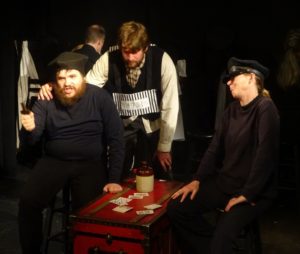Developed and staged in Toronto in the late ’60s and early ’70s, Michael John Nimchuk’s stage adaptation of Jaroslav Hašek’s legendary Czech novel The Good Soldier Schweik hasn’t been performed a lot since then, especially around these parts. But now, director Don Keith and his team have welcomed the challenge of bringing this lesser-known work of Canadian and international theatre to life.
“It’s a story about a man who becomes a soldier in a conflict he doesn’t understand or necessarily support,” explains Keith. “But he gets caught up in it, and he fights for whatever the cause is they’re fighting for. Which is always unclear.”
Like the book it’s based upon, Schweik is a black-humour satire set throughout the course of the First World War, and it follows the exploits of Schweik, a Czech soldier serving in the Austro-Hungarian Army. In the decades since the book’s publication in 1921, the character has become a cultural icon to the Czech people, one whose omnipresence is difficult to overstate. In the remains of the multi-ethnic Austro-Hungarian Empire, the Czechs were forced into the role of the underdog, which ties into the character and the play.

“Schweik has been adopted as their national hero because of humanism and his adventures,” says Keith. “There’s just a strange irony in that, that this character who worked his way up through the ranks, whether because he was a genius or an idiot, could become their hero. That’s very amusing to me, but it’s also very meaningful because he manages to somehow surface as a survivor, which I guess the Czech people have as well.”
The Inconnu production of Schweik is to be staged in a Brechtian style, in which the set is nonexistent and is provided only by projections, the costumes hang on stage, and a small handful of actors portray a wide variety of roles.
“In a Brecht play, you’re assigned to come out and say, ‘You know, guys, this is only a play. Your life is really what this is about. Don’t accept it as realism,’” says Keith. “The switching of characters fits quite well into that. I have six actors that play about 15, 16 roles each. There’s a charm in that, and a wizardry in that, that’s quite magical for audiences. My theory is whatever you set up for an audience, if you do it with enough confidence, they’ll buy into it. When we perform it for audiences, we’ll discover what it means to them. So it’s just something that has to come out by sharing it with people.”
For Keith, the play is a source of endless parallels between the absurdity of war and politics of the past and those same institutions in the modern age, particularly in the wake of America’s recent actions in the international community.
“Nothing’s changed, unfortunately,” says Keith. “I guess we fool ourselves into believing things have changed, but they really haven’t. There’s something else in why men fight each other, or countries fight each other, that is supposedly meaningful, but it’s lost on Schweik, and it’s lost on me as well.”
While the Inconnu team acknowledges the difficulties of bringing a story so famously steeped in Czechoslovakian culture to a modern Canadian audience, Keith maintains that the gap is bridged by the power and relatability of the good-humoured Schweik and his resilience against both the absurdities of bureaucracy and human conflict.
“We look at Schweik as being us, or we’re him,” says Keith. “And there’s maybe some hope in that, or at least some comfort.”
The Good Soldier Schweik
Various times, until Sunday, October 14
Various prices, Theatre Inconnu
theatreinconnu.com


You can learn about more the Good Soldier Švejk at SvejkCentral.com and the latest English translation of the original Czech work at zenny.com.